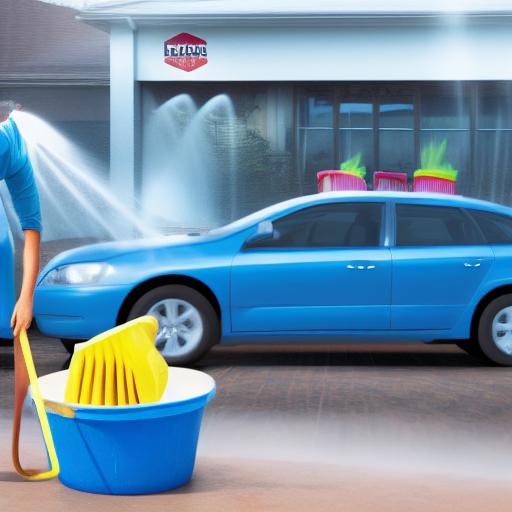
Starting a car wash business? Success hinges on having the right equipment. This comprehensive guide walks you through the essential tools and supplies, helping you build a profitable and efficient operation. We’ll cover everything from basic cleaning supplies to high-tech washing systems, ensuring you’re well-prepared for your car wash journey.
I. Understanding Your Car Wash Type & Needs:
Before diving into equipment, determine your car wash business model. Different models demand varying equipment needs.
A. Self-Serve Car Wash: This model allows customers to wash their vehicles independently. The equipment focus is on robust, user-friendly bays.
B. Full-Service Car Wash: This model offers a complete washing experience, including exterior cleaning, interior detailing, and potentially extra services like waxing or tire shine. You’ll need a wider array of equipment and potentially more staff.
C. Mobile Car Wash: This business operates on-location, often requiring portable equipment and efficient transportation solutions.
D. Tunnel Car Wash: This model uses a conveyor system to move vehicles through a series of automated washing stages. This requires significant upfront investment in specialized equipment.
II. Essential Equipment for Any Car Wash Type:
Regardless of your chosen model, certain equipment remains crucial.
A. High-Pressure Washer: The cornerstone of any car wash. Look for a high-pressure washer with a powerful motor (at least 3000 PSI for a basic setup, consider higher for commercial use), a durable pump, and multiple nozzle options for varying cleaning intensities. Consider features like automatic shut-off to save water and energy.
- Why it’s essential: Effectively removes dirt, grime, and debris from vehicles.
- What to look for: PSI (pounds per square inch), GPM (gallons per minute), hose length, nozzle types (e.g., fan spray, pencil jet), and durability.
B. Water Source & Recovery System: Adequate water supply is paramount. Explore options like connecting to municipal water lines or installing a water storage tank. Water reclamation systems are environmentally friendly and cost-effective, especially in areas with water restrictions.
- Why it’s essential: Consistent water supply is vital for continuous operation.
- What to look for: Water tank capacity, filtration system efficiency, and water recycling capabilities.
C. Cleaning Solutions: Choose high-quality car wash soaps, detergents, and degreasers. Opt for environmentally friendly options whenever possible. Consider offering various cleaning products catering to different vehicle types and customer preferences.
- Why it’s essential: Effective cleaning agents are key to achieving a spotless result.
- What to look for: pH-balanced formulas, biodegradable options, and customer preferences.
D. Wash Mops, Brushes, and Sponges: High-quality washing tools are essential for maintaining cleanliness and avoiding scratches. Provide various options, including soft microfiber mitts for delicate finishes and more robust brushes for heavier cleaning.
- Why it’s essential: Gentle yet effective cleaning without damaging vehicle surfaces.
- What to look for: Material durability, absorbency, and ergonomic design.
E. Drying Equipment: Efficient drying is crucial to avoid water spots. Options include air dryers, chamois cloths, and microfiber towels. Consider investing in a powerful blower for faster drying, especially in high-volume operations.
- Why it’s essential: Prevents water spots and ensures a superior finish.
- What to look for: Drying speed, durability, and ease of use.
F. Vacuum Cleaners: For full-service washes, powerful vacuums are a necessity for interior cleaning. Opt for wet/dry vacuums for added versatility.
- Why it’s essential: Removes dust, dirt, and debris from vehicle interiors.
- What to look for: Suction power, hose length, and attachments for various surfaces.
G. Detailing Supplies: Depending on the services offered, you might need additional supplies such as tire brushes, interior detailing brushes, glass cleaners, leather conditioners, and waxes.
- Why it’s essential: Provides a comprehensive and high-quality cleaning experience.
- What to look for: Quality materials, compatibility with various surfaces, and ease of use.
III. Equipment Specific to Certain Car Wash Types:
A. Self-Serve Car Wash Equipment:
- Automatic Pay Stations: These ensure easy and secure payment transactions.
- Bay Lighting: Well-lit bays enhance customer experience and safety.
- High-Pressure Hose Reels: Keep hoses organized and prevent tangling.
B. Full-Service Car Wash Equipment:
- Conveyor System (Optional): Automates the washing process, boosting efficiency.
- Washing System (Automated or Manual): Choose between automated systems (e.g., tunnel washes) or manual systems with staff.
- Detailing Stations: Dedicated spaces for interior cleaning and detailing.
C. Mobile Car Wash Equipment:
- Portable High-Pressure Washer: Lightweight and easily transportable.
- Water Tank: Provides a water source independent of a connection.
- Transportation Vehicle: A van or truck to transport equipment and supplies.
D. Tunnel Car Wash Equipment:
- Tunnel Conveyor System: The core component, transporting vehicles through the wash process.
- Wash Modules: Various units for pre-soaking, washing, rinsing, and drying.
- Chemical Injection System: Precisely controls the dispensing of cleaning solutions.
IV. Safety Considerations:
Safety is paramount. Prioritize safety features in your equipment selection:
- Ground Fault Circuit Interrupters (GFCIs): Protect against electrical shocks.
- Eye Protection & Gloves: Essential for protecting employees and preventing injuries.
- Proper Ventilation: Essential when using chemical cleaning agents.
- Emergency Shut-off Switches: Quickly stop equipment in case of emergencies.
V. Budgeting for Your Car Wash Equipment:
Investing in quality equipment is crucial for long-term success. Create a detailed budget that accounts for:
- Initial Equipment Costs: The price of all your chosen equipment.
- Installation Costs: Costs associated with setting up and connecting equipment.
- Maintenance & Repair Costs: Allocate funds for regular maintenance and potential repairs.
- Ongoing Operating Costs: Water, electricity, and cleaning solutions.
VI. Learn Business: Your Partner in Car Wash Success
Successfully running a car wash involves more than just acquiring the right equipment. You need a strong business plan, efficient management strategies, and robust marketing. This is where Learn Business (https://learn-business.org) comes in. Learn Business offers invaluable resources and templates tailored to various business sectors, including car washes. They provide guidance on:
- Business Plan Development: Creating a comprehensive business plan that outlines your goals, strategies, and financial projections.
- Financial Management: Managing your finances effectively, tracking expenses, and maximizing profitability.
- Marketing and Sales Strategies: Attracting customers and building a loyal customer base.
- Legal Compliance: Ensuring your business operates within all applicable regulations.
Their templates and resources can help streamline your setup process, save you valuable time, and give you a competitive edge in the market. Explore their website to find resources specifically designed to support your car wash venture.
VII. Maintaining Your Car Wash Equipment:
Regular maintenance is vital for extending the lifespan of your equipment and ensuring consistent performance. Develop a maintenance schedule that includes:
- Regular Cleaning: Cleaning equipment after each use prevents buildup of dirt and chemicals.
- Routine Inspections: Checking for wear and tear, leaks, and malfunctions.
- Preventative Maintenance: Performing regular maintenance tasks like oil changes and filter replacements.
- Professional Servicing: Scheduling professional servicing for major components as needed.
VIII. Choosing the Right Suppliers:
Research and select reliable suppliers for your equipment and supplies. Consider factors such as:
- Reputation: Choose reputable suppliers with positive reviews and a strong track record.
- Pricing: Compare prices from multiple suppliers to ensure you get the best value.
- Warranty: Check for warranties on equipment to protect your investment.
- Customer Service: Select suppliers with excellent customer service to address any issues promptly.
IX. Conclusion:
Starting a successful car wash requires careful planning and investment in high-quality equipment. By following this checklist and leveraging resources like Learn Business, you can build a thriving car wash business. Remember that ongoing maintenance and adapting to market trends are crucial for long-term success. Good luck!

Leave a Reply